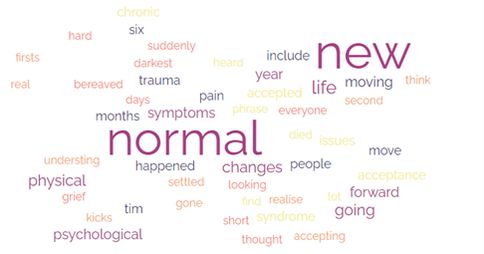|
After Tim died, I heard the phrase ‘the new normal’ a lot. That I would find my ‘new normal’. That people settled into their ‘new normal’. That the ‘new normal’ kicks in after six months when you realise that it’s all real, or in the second year when all the firsts are over. But what is the new normal?
I think it’s about understanding the changes that we have gone through, accepting what has happened, and looking at how we move forward. This is about how it’s happened for me. It’s not the same for everyone, and for people in the darkest days of grief, the thought of a new normal may be too hard. The new normal: Physical and psychological The trauma of being bereaved, whether it’s suddenly or after a short or long illness, changes us physically and psychologically. Physical symptoms include headaches, chest pain, muscle and joint aches, sleep issues and immune system issues. Psychological changes include brain fog, flashbacks, panic attacks, dissociation and hyperarousal. Trauma also increases the risk of self-harm and suicidal feelings, and of irritable bowel syndrome (IBS), fibromyalgia and chronic pain, and chronic fatigue syndrome (CFS/ME). These changes don’t always last forever – for me, the physical symptoms eased after six months or a year, and the worst of the psychological symptoms after a year or two. It’s important that we look after ourselves, and this isn’t about fluffiness and bubble baths. It’s about genuinely being kind to ourselves, and about taking proper care of our mental and physical health. The new normal: Acceptance The new normal can be about acceptance, and this was significant for me. I accepted that this was my life now. That things were never going to be the same again. For a while it was just about keeping going, and putting one foot in front of the other. The next phase was reclaiming a space and a life for myself – I cleared and redecorated, I went back to university, I started The Widow’s Handbook. I accepted that grieving was a long-term thing. That I wasn’t going to ‘get over it’, or ‘move on’. That it was something that I was going to walk alongside. I also gave myself permission to feel happy again. The new normal: Moving forward Ever since I saw this brilliant TED talk from Nora McInerny, I have talked about ‘moving forward’ not ‘moving on’, because I have taken Tim with me into my new life. While it’s not the life I expected or planned for, it’s the life I have and it’s a life I like.
0 Comments
There isn't much information on the issues associated with the combination of grief and the menopause. So this is going to be rather shorter than I hoped it would be. The symptoms of the menopause, such as lack of sleep, loss of self-confidence, low mood, anxiety, brain fog, weight changes, emotional overload, exhaustion and flare ups in other health conditions, can overlap with many of the experiences in grief and blur in together. This can make it harder to work out what is grief and what is the menopause and makes both feel worse. The stress associated with grief may also worsen menopause symptoms, and there is a possibility that stress could even bring on an earlier menopause. There can be grief associated with the menopause itself, which could complicate the grief of bereavement. Menopause can bring up thoughts of the loss of youth and of aging, which may trigger grief about the loss of a partner.
For people who are grieving, the menopause can highlight the secondary loss of the chance of conceiving and carrying a baby. This can be especially hard for those who were trying for children at the time of their partner's death. The menopause also comes at a time where people may be caring for aging parents, or grieving their loss and missing their support. The fact that the symptoms of perimenopause and menopause and the symptoms of grief are so hard to separate may also mean that women (and trans and non-binary people) don't seek help for menopausal symptoms at what is already a difficult and overwhelming time. Coping with grief and the menopause Like grief, there is no one solution to the menopause. Be aware that the menopause may be masking or adding to your grief symptoms and be gentle with yourself. If you are struggling with the menopause talk to your doctor – there are options that can help you deal with the physical and psychological symptoms. Grief is bad enough without the menopause making it worse. HRT can help with some symptoms (I have just started with HRT patches to see if they can help with my fluctuating body temperature and disturbed sleep). The Menopause Charity's website has information, news and expert advice, and the NHS website has a section on 'Things you can do'.  Straight after Tim died, my head was full of fog. I felt disconnected from the world. And I think this was my brain protecting me from the awfulness of what had just happened. While the disconnection went away, the brain fog – known as widow brain or grief brain – stayed. It's a feeling that you can't think straight, and with it comes short term memory loss, numbness, lack of ability to process information or instructions, tiredness and lack of focus. It can also leave your temper out of kilter - I snapped at people and got very angry at myslef. But be reassured – it's normal. Our brains are acting to protect us from the trauma. Widow brain, for many people, lifts in the first year to 18 months, but it lasts for different lengths of time for different people, and stress or milestones can make it worse. For people who have been caring for someone for a long time, part of widow brain may be a loss of purpose. Grief can also mean not eating properly, not exercising, or not sleeping well, and this all feeds into widow brain. The science bit Emotional traumas affect how our brains work. Imaging the brain shows that mental and physical pain trigger the same areas of the brain. While it's nothing like the same level of trauma, a brain imaging study in people who have recently split up with their partners shows that it affects their executive function, the system in the brain that sits in the prefrontal cortex and supports your ability to understand, decide, recall, memorise and have self-control. Your prefrontal cortex gets overloaded by grief and makes it harder to function well. The practical bit Rest Grief has made me the most tired I have ever been. So tired my bones hurt. Rest your mind and your body when you can. Tell people Explain to people what's going on in your head, and send them this blog post if they don't get it. Decisions A really useful piece of advice for me was not to make any major decisions for the first year. To do lists and notes Write things down. To do lists are useful, and have stopped me forgetting to do many, many things (the combination of widow brain and ADHD really doesn't help my memory!) Break tasks down into the smallest bits possible – rather than having a to do for 'put everything into my name', break it into house insurance, deeds, rent' etc. That way tasks are less daunting, and crossing off each small thing make it feel like an achievement.
Reminders Digital reminders rule my life. I use smartphone alarms to remind me to do things that are daily or weekly. I put appointments with reminders on my digital calendar for everything from whether it's bin day or recycling day, through birthdays, to work deadlines and days out, and I can access this on both my phone and my computer. Physical reminders can also be helpful. If you need to remember to take something with you when you go out, put it on the doormat, or leave a sticky note on the front door (I get through a lot of sticky notes). Out-sourcing Have a pad of sticky notes and a pen somewhere convenient. When you think of something that needs doing, write it on the sticky note and put it on the wall. When someone says 'what can I do', give them a sticky note. Stilling the whirling thoughts Grounding can help to still your brain when everything is churning around and destroying your ability to focus. Self-care Be kind to yourself and forgive yourself. Remember – you are only human. You've been through a lot. And you are grieving. It's not your fault your head is like this. In the end, things getting missed or forgotten are very rarely the end of the world. |
AuthorI was widowed at 50 when Tim, who I expected would be my happy-ever-after following a marriage break-up, died suddenly from heart failure linked to his type 2 diabetes. Though we'd known each other since our early 20s, we'd been married less than ten years. Archives
July 2024
Categories
All
|




 RSS Feed
RSS Feed